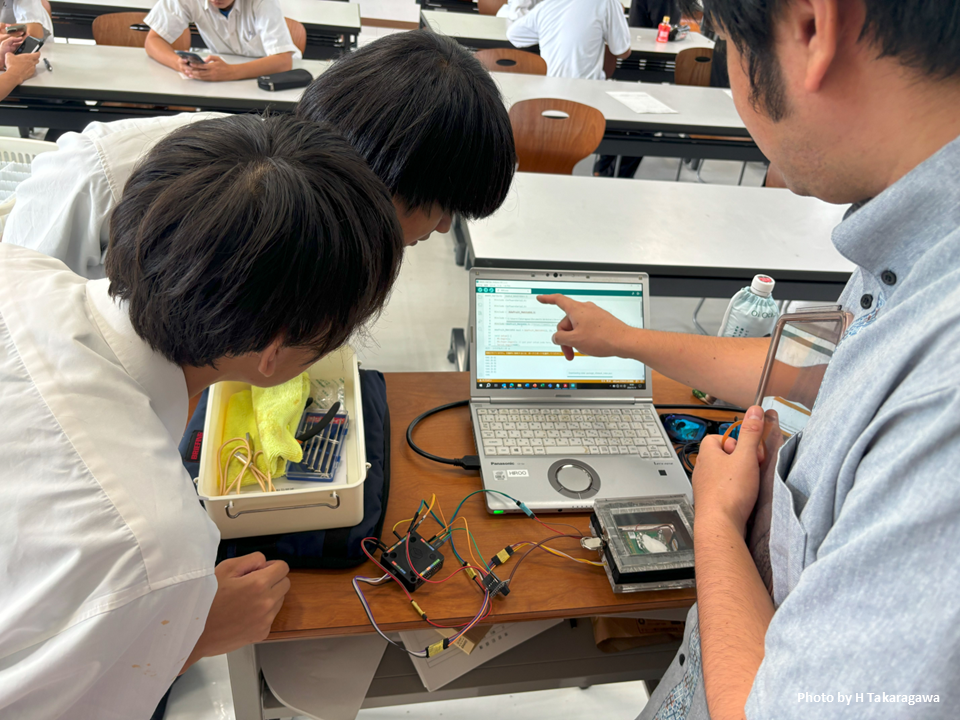Pick Up
1157. Eager to contribute to the development of human resources who will lead Okinawa's agriculture in the future (Takaragawa’s Newsletter)

1157. Eager to contribute to the development of human resources who will lead Okinawa's agriculture in the future (Takaragawa’s Newsletter)
JIRCAS does not have a laboratory system like a university, but has a project system that brings together issues related to the target countries on the horizontal axis and seven specialized fields (rural development, social sciences, biological resources and utilization, production environment and livestock production, forestry, fisheries, and tropical agriculture research front) on the vertical axis. Each researcher engages in research within a matrix system where both axes intersect. In addition to different specialties, the target species are diverse, including cereals, tropical fruit trees, vegetables, forests, sugarcane, grasses, seaweeds, livestock, insects, soil animals, and microorganisms, as well as food-related researchers who study the processing of agricultural products, and social researchers who focus on humans and the environment. The Institute is one of the few research institutions in Japan that conducts research based on an interdisciplinary approach through the exchange of a diverse range of researchers.
In this context, JIRCAS is actively recruiting new young researchers, and is also making efforts to foster human resources in Japan and overseas who are expected to play an active role in international agricultural research in the future, including JIRCAS Fellows, trainees, and visiting lecturers. In this report, the author gave a lecture as an outreach activity to high school students at the request of Okinawa Prefectural Hokubu Norin High School, which was selected for the 2024 DX Acceleration Promotion Project for High Schools (DX High School).
This project, administered by the Ministry of Education, Culture, Sports, Science and Technology (MEXT), supports unique initiatives to strengthen cross-disciplinary and inquiry-based learning using ICT, in addition to conventional curriculum education, in order to fundamentally strengthen human resource development in higher education to support highly growing fields such as digital fields. The Hokubu Norin High School aims to develop human resources for smart agriculture through the use of data science and smart agricultural equipment, aiming for agricultural learning with a broad perspective by utilizing advanced human resources in collaboration with universities and research institutions. The author gave three lectures, “Observing Plants with Scale Change,” “Making Devices to Measure Plants and the Environment,” and “Listening to Plants and Farmers,” in each of his assigned classes. The lectures focused on the significance of observing plants and its methods, and introduced the fun of creating one's own observation and measurement devices by learning programming languages and electronic construction techniques using knowledge from Internet searches, even for amateurs. I also explained the importance of listening to the voices of individual beneficiaries such as farmers (i.e., importance of n=1) and their methods in the context of current social structures such as information technology and diversity.
In the future, I would like to gain experience working overseas so that students can acquire a multifaceted viewpoint by introducing agriculture and research outside of Japan. In addition to delivering lectures, I also plan to be actively involved in advising students on their assigned studies, and to play a role in fostering human resources who will be responsible for agriculture and agricultural research in Okinawa Prefecture.
P.S. I plan to report on our research work and outreach activities in the Takaragawa’s Newsletter in the future. I would appreciate your feedback.
(written by Hiroo Takaragawa, TARF)
